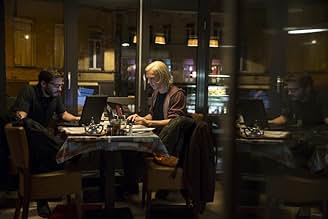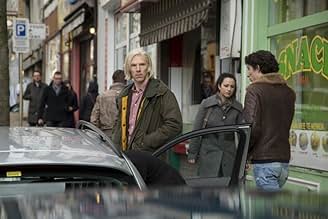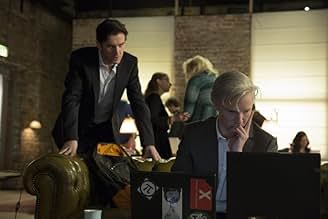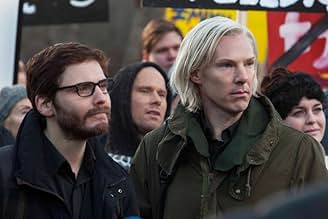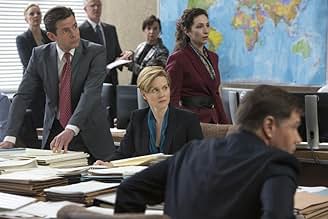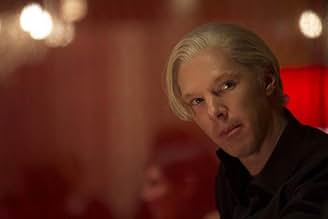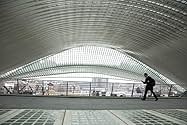Gli inganni ed i complotti per il potere che hanno fatto di Internet l'organizzazione più ferocemente dibattuta del XXI secolo.Gli inganni ed i complotti per il potere che hanno fatto di Internet l'organizzazione più ferocemente dibattuta del XXI secolo.Gli inganni ed i complotti per il potere che hanno fatto di Internet l'organizzazione più ferocemente dibattuta del XXI secolo.
- Regia
- Sceneggiatura
- Star
- Premi
- 2 vittorie e 3 candidature totali
Recensioni in evidenza
Title (Brazil): "O Quinto Poder" ("O Quinto Poder")
I come at this film from a slightly different point of view because I still don't know what was so fabulous about "The Social Network." I understand the comparisons due to the similar stories. People seemed to find "The Social Network" incredibly compelling, but I guess it's a generational thing - I just didn't.
I attended this film with a friend who had only a vague knowledge of Wikileaks, and he absolutely loved it and found the "redaction" scenes toward the end of the film tense and suspenseful, as I did.
I realize that some of the film may be fictional, and that Wikileaks is a controversial subject. I can't pretend to know the truth. Cumberbatch portrays Assange as an egomaniacal, protective, arrogant man who refuses to compromise, even when information may hurt people. His right hand, Daniel (Daniel Bruhl) begins to see that Assange's dictatorial attitude and paranoia has gone too far and is actually in the long run going to hurt what could have been an important organization.
What should we know, and when should we know it? Assange wants to release unedited documents onto the World Wide Web. Yet in the beginning of the film, he wants at all costs to protect sources. He seems to forget that later on. That's all in the film, based on two books that we're told are biased.
Still, The Fifth Estate raises some interesting questions and also talks about the challenges we face now with news going out onto the Internet. I think some transparency is healthy; I don't think banks should help customers cheat the U.S. out of $30 billion in taxes; but I don't believe military strategy should be leaked, and I believe that sources should be protected. It seems like so much of what we hear today, from politicians and celebrities and publicists is "spin." And most of us are aware that there's more than they're telling us.
As far as the acting, Laura Linney and Stanley Tucci are marvelous in small roles; Cumberbatch gets excellent support from Bruhl, Alicia Vikander, Jamie Blackley, and the rest of the cast.
In short, Cumberbatch's performance should be seen and appreciated. I think this film has gotten a bad rap. It's certainly not an awful film.
I found "The Fifth Estate" intriguing, fun, and moving. Benedict Cumberbatch is very good as Assange. The movie wants you to be impressed by him at first, but slowly to see his feet of clay, and Cumberbatch does that job. Daniel Bruhl plays Daniel Domscheit Berg, Assange's partner. Bruhl expresses disappointed hero worship very well. Assange is invited to Berg's home for dinner, and he disrespects Berg's polite parents. That intimate, believable scene makes you hate Assange in a way that his secret-releasing shenanigans might not.
"The Fifth Estate" struggles, as all computer-related films do, to depict life on a computer. It creates a fake office with the sky as ceiling where Assange's "volunteers" work. Assange describes his submission process at Wikileaks and pages appear on screen. These visual flourishes are fun.
The movie is interesting and fast-moving but not very deep. There are very big questions at play here and "The Fifth Estate" does not engage them deeply. Laura Linney plays Sarah, an American agent whose contact, Tarek, is endangered by Assange's revelations. There is some tension as Tarek flees Libya. Will he get out before Assange outs him, or will he and his family be captured and perhaps tortured by their oppressive government?
Perhaps if "The Fifth Estate" had been more art than docudrama it could have gone deeper. Imagine a conversation between Sarah and Assange. One could argue for the importance, both strategic and humanitarian, of state secrets, and the other could argue against. Other questions – aren't secrets inevitable? Accept it: there is stuff you are simply never going to know.
And, in the end, what difference did Assange make? The US is still in Afghanistan. Guantanamo still operates. People will pay more attention to Miley Cyrus twerking than to documents about torture in a Third World nation. Someone said once of the Cambodian genocide that no one will ever read all the documents the Khmer Rouge amassed. No one cares enough to do so.
Laura Linney is every bit the actor that Benedict Cumberbatch is. I'd love to have heard these two characters have this conversation.
Anyways, let's focus on my reaction to the feature in general with as much honesty as possible. I won't lecture you on how much you should hate the NSA and the government's surveillance activities nor should I protest such anarchists' decisions. I'll judge the film as it should be judged, but of course, the level of its accuracy should absolutely be considered. Concentrating on the strengths at first, right off the bat, it's quite obvious just how exceptional the lead performances from Benedict Cumberbatch and Daniel Bruhl are, and as usual, Cumberbatch carries that impressive volume of charisma with him where you simply can't take your eyes off his mannerisms and speech (I believe I already noted this in my Star Trek review); in short, his portrayal of Julian Assange is terrifically veracious. Daniel Bruhl, coming off of his memorable performance in Rush, makes his mark yet again, playing a foil to Julian in a way. Furthermore, The Fifth Estate unquestionably works as a full-fledged thriller with the several twists and turns throughout. The story, itself, is compelling and though it's abundantly filled with journalistic terminology and complicated concepts, you're forced to dedicate twice the attention to the screen.
On that note, The Fifth Estate suffers from a highly noticeable and detrimental flaw: its messy execution. What fundamentally follows persistently throughout the narrative are perplexing scenes that leave the audience scratching their head- and not in a good way in case you're asking. The movie's editing style and script will doubtlessly leave you confused in numerous instances. While you're attempting to understand how exactly a specific action or trade works, the film casts you into another situation that leaves you baffled yet again, and this really stems from- as previously mentioned- its wide array of terminology and the fast pace with which it irresponsibly deals with its explanation to the moviegoers. This is precisely why The Social Network shone in its brilliance: it was perfectly comprehensible and continued with remarkable execution- the pure opposite of The Fifth Estate. By the time the story comes to a conclusion, you will have likely properly sorted the film's ideas but to have a thriller work is to avoid placing your interested crowd into a muddled and jumbled predicament as it lessens the satisfaction and surprise that comes with a thrilling experience.
At the end of the day, The Fifth Estate is great in that it sparks a mixed reaction and requires both extreme sides of the table to continuously argue over the rightfulness or criminality of Wikileaks' existence and the path that Julian Assange took to see it to success. There are too many factors to just definitively point out if you should or shouldn't view it. However, if you're not one for complicated, fast- paced political thrillers, this probably won't be an enjoyable time at the movies. Otherwise, there might be something here that'll get you thinking about the whole debacle of our privacy vs. the so-called "evil government."
The film was not bad. It was sort of an attempt to make a Facebook style film about Wikileaks and although it nowhere measured up to the quality of "Social Network." Its attempt was commendable and all-in-all, it was not a waste of the 18 Euros we spent to see it.
However, what really bothered me throughout the entire film was Cumberbatch's portrayal of Assange. I could see he was trying very hard to mimic Assange to the best of his ability, but I either don't think he had it in him or he was purposely playing Assange a lot crazier than he appears in real life. I have seen lots of interviews with Assange, who in my mind, comes across a bit like a mixture between a politician and professor. Cumberbatch, on the other hand, came across as a sort of eccentric nut.
The next thing that bothered me is where the film decided to stop. Basically, it skimmed over the current scandals, making Assange sound like more of nut than Cumberbatch's portrayal. The last five minutes especially sunk into me the feeling that the film unfairly portrayed Assange.
And my suspicions were confirmed. I asked my wife what her opinion of Assange was as a good or bad guy, and she seemed to indicate she was leaning towards bad. The last few minutes of the film, basically sunk that message in loud and clear.
My conclusion is, that, this film is a good example of the new way of being critical. Pretend to be fair and at the last minute, throw up a bunch of negative facts.
I believe that combining the positive portrayal of the U.S. state department with the crazy portrayal of Assange, was neither fair nor accurate. History will probably judge this film as just another propaganda piece of the corrupt powers that be.
If I were to write this film, I think it would have been much more interesting to concentrate on the incidents of human rights abuses rather than on the Assange himself. It would have also had the positive effect of encouraging, rather than discouraging whistle-blowers. This film does not seem to inspire anything.
Assange was right about the film.
Lo sapevi?
- QuizJulian Assange emailed Benedict Cumberbatch to ask him to not to participate in the film.
- BlooperAfter Julian and Daniel fight and finally split up there is a shot of the streets outside Daniel's apartment by night. Two cars drive past backwards, revealing the film has been played in reverse.
- Citazioni
Julian Assange: If you want the truth, no one is going to tell you the truth, they're going to tell you their version. So if you want the truth, you have to seek it out for yourself. In fact that's where power lies, in your willingness to look beyond this story, any story. And as long as you keep searching, you are dangerous to them. That's what they're afraid of: you. It's all about you. And a little bit about me too.
- ConnessioniFeatured in The Agenda with Tom Bradby: Episodio #4.1 (2013)
- Colonne sonoreStompbox (Spor Remix)
Written by Liam Black, Leon Harris and Daniel Arnold
Performed by The Qemists
Courtesy of Ninja Tune
I più visti
Dettagli
- Data di uscita
- Paesi di origine
- Lingue
- Celebre anche come
- El quinto poder
- Luoghi delle riprese
- Domaine provincial d'Hélécine, 2 rue Armand Dewolf, Hélécine, Walloon Brabant, Belgio(White House interior scenes)
- Aziende produttrici
- Vedi altri crediti dell’azienda su IMDbPro
Botteghino
- Budget
- 28.000.000 USD (previsto)
- Lordo Stati Uniti e Canada
- 3.255.008 USD
- Fine settimana di apertura Stati Uniti e Canada
- 1.673.351 USD
- 20 ott 2013
- Lordo in tutto il mondo
- 9.058.564 USD
- Tempo di esecuzione2 ore 8 minuti
- Colore
- Mix di suoni
- Proporzioni
- 2.35 : 1
Contribuisci a questa pagina








